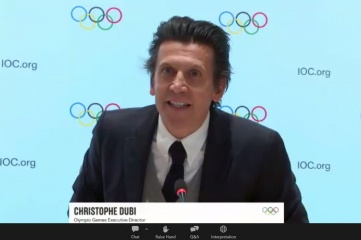Concerns about the effects of climate change on potential hosts of the Winter Olympics have led the IOC to delay the election of the host of the 2030 Games.
Speaking at a press conference following an update from the Future Host Commission for the Olympic Winter Games at the IOC Executive Board meeting in Lausanne, Christophe Dubi, Olympic Games Executive Director said, “The Commission, building on Agenda 2020, outlined a number of proposals, but also potential uncertainties around hosting the winter Games which could have an impact on future elections.”
Global warming means the IOC could have a smaller pool of potential hosts of Winter Games to choose from.
“We have preliminary results on leading academic research on the impact of climate change which shows a potential reduction in the number of climate-reliable hosts in the future,” said Dubi.
The IOC Executive Board also heard how winter federations have already started to adjust their event calendars and formats.
It was also suggested that the Olympic Winter Game hosting rights might rotate “between a certain pool of cities and regions.”
There was also a conversation about further prioritising existing venues in the host selection criteria. “It is felt that for the future we should target hosts that can display all venues to be existing or temporary.”
Another proposal discussed would require future hosts to “show a minimum average of below zero [degrees Celsius] for snow competition venues at the time of the games over a ten-year period.”
“All these being considered, on the request of the Commission, the IOC Executive Board decided to give the Winter Commission more time to study all these factors and opportunities to make the best possible decisions about future hosting.
“It will enable the Commission to consult deeply with interested parties, IFs, NOCs, the athletes, winter sports industry experts and the IPC – because we are operating over a full month and that needs to be considered in a global warming environment.
“This will give the Commission more time to have a clearer picture and make a sounder decision for 2030.
“This means we are not targeting an election of the host of the Olympic Winter Games 2030 at the 114th Session in 2023,” said Dubi.
“This is in line with the new flexible approach to electing Olympic hosts under which the Executive Board has the authority to determine the timing of the election in the interest of the Olympic Movement.”
The Executive Board also discussed the possibility of awarding the hosting rights to 2030 and 2034 simultaneously to “create stability for the winter sport and the Olympic Winter Games.”
Dubi said “The three interested parties have been informed of those conversations and discussions,” without naming the cities. Sapporo and Salt Lake City are interested parties; Vancouver was out of contention but may be back in the running.
The host selection process is still in the “continuous dialogue” stage, Jacqueline Barrett, Director of Future Olympic Games Hosts at the IOC explained.
“We haven’t opened targeted dialogue yet. So not targeting next year for a session will allow more time to develop these projects before when the commission feels its ready, to open a targeted dialogue.”
The IOC did not confirm the details of the changed timeframe for opening targeted dialogue, and subsequently electing the host city.
“We are not going to push this decision many years down the road. We are still in continuous dialogue which is non-committal and open at this stage,” Barrett said.
“The mandate of the Commission is to ensure that there will always be a healthy pipeline of interest for the future… our door is never closed.
“There was a collective recognition around the table today… there are these concerns about the future of the Winter Games; the future of being able to practice Winter Games in the future – everyone is concerned about this.”
Sarah Lewis OBE OLY, Deputy Secretary General & Chief Operating Officer of FISU, and former Secretary General of FIS, told Host City: "Winter sports are and will increasingly need to adapt to a warming planet. We need to recognize our responsibility to ensure events are hosted in the most sustainable way possible today while having an adaptative, innovative and creative mindset regarding what winter sports will look like in the future. Transition is always painful but innovation and an adaptive, responsible mindset will hopefully enable a dynamic and engaging future for our athletes and all those engaged in winter sports.
"Lake Placid as Organiser of the FISU World University Games in January 2023 has embraced sustainability as a core element of the Games. Alongside the competitions themselves, the Lake Placid World Forum 2023 'Save Winter' will address this topic with leading academics and practitioners. Save Winter is a movement to unite all of us who love winter to work as one to save the season of snow. More than 40 million of us enjoy winter sports and recreation. Save Winter will help ensure we’re doing everything we can to reduce our impact on the planet and enjoy winter as it was meant to be enjoyed. It’s about more than just snow - it’s about keeping winter for generations to come."


